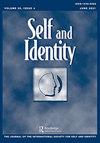诱导快乐与悲伤对三种自我控制任务的影响
IF 2.1
4区 心理学
Q3 PSYCHOLOGY, SOCIAL
引用次数: 0
摘要
人们如何才能在需要自我控制的情况下取得成功?其中一种机制可能是通过快乐等积极情绪来实现的,尽管以前的研究很有限,而且结果也不一致。本文章由计算机程序翻译,如有差异,请以英文原文为准。
The effect of induced happiness versus sadness on three types of self-control tasks
How can people succeed in situations that require self-control? One mechanism might be through positive emotions such as happiness, although previous studies are limited and have yielded inconsiste...
求助全文
通过发布文献求助,成功后即可免费获取论文全文。
去求助
来源期刊

Self and Identity
PSYCHOLOGY, SOCIAL-
CiteScore
5.10
自引率
5.00%
发文量
26
期刊介绍:
Work on self and identity has a special place in the study of human nature, as self-concerns are arguably at the center of individuals" striving for well-being and for making sense of one"s life. Life goals develop and are influenced by one"s view of what one is like, the way one would ideally like to be (or would like to avoid being), as well as one"s perceptions of what is feasible. Furthermore, conceptions of self and the world affect how one"s progress towards these goals is monitored, evaluated, redirected, re-evaluated, and pursued again. Thus, the “self” as a construct has far-reaching implications for behavior, self-esteem, motivation, experience of emotions and the world more broadly, and hence for interpersonal relationships, society, and culture.
 求助内容:
求助内容: 应助结果提醒方式:
应助结果提醒方式:


